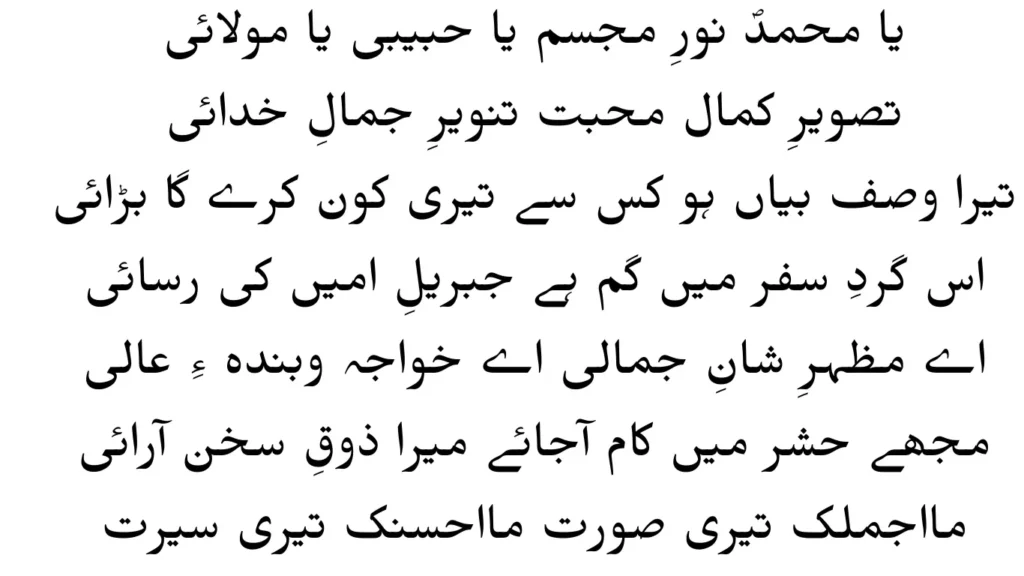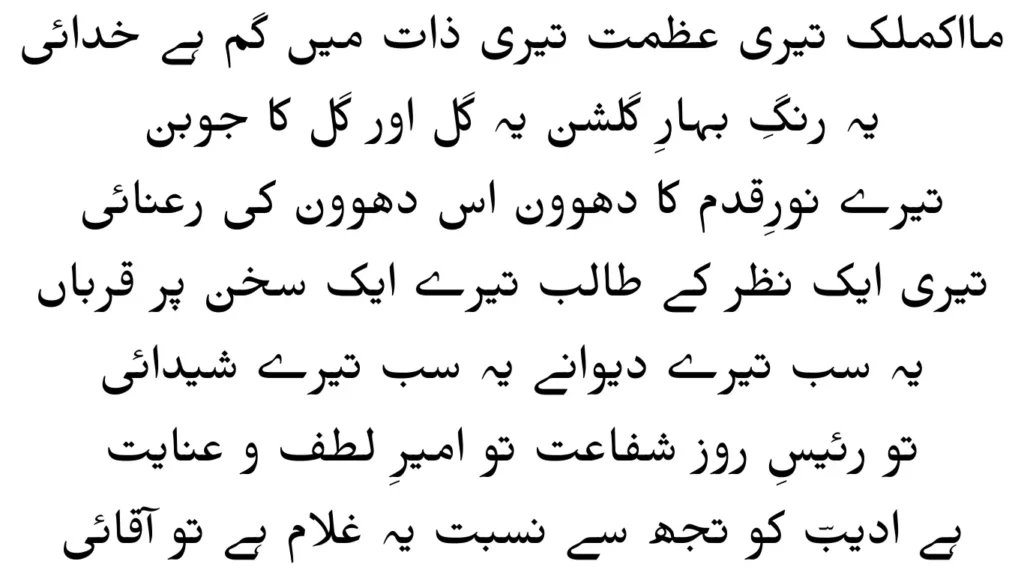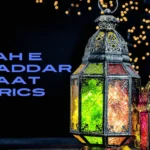Islamic naats, such as Ya Muhammad Noor-e-Mujassam, are profound expressions of devotion and admiration for Prophet Muhammad (ﷺ). This naat celebrates the Prophet as the embodiment of divine light and guidance for humanity. It poetically conveys themes of love, spirituality, and the unparalleled virtues of the Prophet. Below, we analyze each verse in depth, exploring its spiritual significance and poetic beauty.
| Tera Khawan Mein Tere Geet Gawan Lyrics |
| Naat Bulalo Phir Mujhe ey shahe bahrobar Lyrics |
| Ya Nabi Nazre Karam Farmana Lyrics in Urdu |
| Lamyati Nazeero Kafi Nazarin Naat Lyrics |
Verse 1: Ya Muhammad Noor-e-Mujassam, Ya Habibi Ya Maulai
Translation:
“O Muhammad, Light Incarnate, O my Beloved, O my Master.”
Reflection:
The opening line establishes the Prophet Muhammad (ﷺ) as the embodiment of divine light (Noor-e-Mujassam). It highlights the dual roles of the Prophet as a spiritual guide (Habibi) and a leader (Maulai). This verse reflects the believer’s deep love, reverence, and reliance on the Prophet as a source of guidance.
Verse 2: Tasveer-e-Kamal-e-Mohabbat, Tanveer-e-Jamal-e-Khudaayi
Translation:
“The image of perfect love, the illumination of Divine beauty.”
Reflection:
This verse portrays the Prophet as a manifestation of Allah’s perfect love and beauty. It emphasizes how his existence reflects divine attributes, making him a beacon of mercy and compassion for all of creation.
Verse 3: Tera Wasf Bayaan Ho Kis Se, Teri Kaun Karega Barhai
Translation:
“Who can describe Your virtues? Who can extol Your greatness?”
Reflection:
This line conveys the Prophet’s unmatched excellence, which is beyond human comprehension. It humbles the believer, reminding them of the limitations of human understanding in capturing the greatness of the Prophet.
Verse 4: Is Gard-e-Safar Mein Gum Hai Jibreel-e-Amin Ki Rasai
Translation:
“Even Jibreel (Gabriel) is lost in the dust of this journey to comprehend You.”
Reflection:
This verse highlights the transcendence of the Prophet Muhammad’s status, which even the archangel Jibreel struggles to fully grasp. It underlines the Prophet’s elevated position in the cosmos.
Verse 5: Aye Mazhar-e-Shaan-e-Jamali, Aye Khwaja-o-Banda-e-Aali
Translation:
“O Manifestation of Divine Majesty, O Master and Noble Servant.”
Reflection:
The dual role of the Prophet as a servant of Allah and a leader of humanity is emphasized here. He is celebrated as a mirror reflecting Allah’s majesty and a noble example of servitude.
Verse 6: Ma Ajmalaka Teri Soorat, Ma Ahsanaka Teri Seerat
Translation:
“How beautiful is Your appearance, how excellent is Your character.”
Reflection:
This verse is inspired by the well-known hadith describing the physical beauty and noble character of the Prophet Muhammad (ﷺ). It captures the essence of his perfection, both externally and internally.
Verse 7: Teri Ek Nazar Ke Talib, Tere Ek Sukhan Par Qurban
Translation:
“They seek just one glance from You; they are ready to sacrifice for one word from You.”
Reflection:
The undying devotion of the Prophet’s followers is beautifully expressed here. It reflects their willingness to give up everything for his blessings and his words.
Verse 8: Tu Raees-e-Roz-e-Shafaat, Tu Ameer-e-Lutf-o-Inayat
Translation:
“You are the Chief of the Day of Intercession, the Leader of Grace and Mercy.”
Reflection:
This verse celebrates the Prophet’s role as an intercessor on the Day of Judgment. It also highlights his attributes of grace and mercy, which continue to benefit humanity.


FAQs:
The central theme of the naat is the celebration of Prophet Muhammad (ﷺ) as the embodiment of divine light, unparalleled virtues, and a source of guidance and mercy for humanity.
Noor-e-Mujassam” translates to “Light Incarnate,” signifying that the Prophet (ﷺ) is a living manifestation of divine light and guidance.
The mention of Jibreel (AS) highlights the Prophet’s elevated status, which even the archangel struggles to comprehend, emphasizing the Prophet’s unique rank in creation.
Conclusion
“ya muhammad noor e mujassam naat lyrics” is a poetic masterpiece that beautifully encapsulates the love, reverence, and admiration for Prophet Muhammad (ﷺ). Each verse takes the listener on a spiritual journey, highlighting his unmatched virtues, divine connection, and the deep love his followers feel for him. This naat not only glorifies the Prophet but also serves as a reminder of the profound impact of his teachings on humanity.




